Daughter Says Iranian Filmmaker Did Not Commit Suicide As Claimed
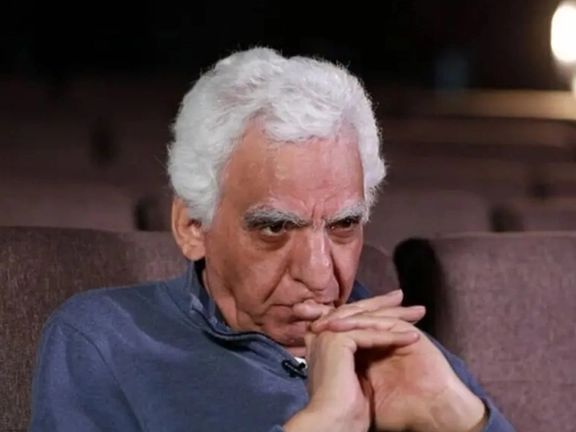
Veteran Iranian filmmaker Kyumars Pour-Ahmad did not commit suicide as the Iranian government has claimed, her daughter has said in an interview this weekend.

Veteran Iranian filmmaker Kyumars Pour-Ahmad did not commit suicide as the Iranian government has claimed, her daughter has said in an interview this weekend.
Initially, it had been reported in April last year that Pour-Ahmad died from heart failure, but soon after, officials announced the 74-year-old had taken his own life.
Mehdi Fallahmiri, the prosecutor in Gilan Province, who at first dispatched a murder investigation team to inquire about Pour-Ahmad's death, ruled the death was suicide. However, he later said "further investigation" is needed. But there hasn't been an update since last year.
Turan Pour-Ahmad, the director's sister, wrote in an Instagram post on the first anniversary of his death in early April, "First they tortured my brother, then they hanged his dead body."
Later on, Pegah Pour-Ahmad, the daughter of the director and screenwriter, said in an interview with Etemad newspaper on Saturday: "What my aunt said is true. But we won't discuss the case details until the right time comes. My father knew what they were going to do to him. To say that he killed himself is not true."
Last year, Mehdi Kouhian, a lawyer involved in the legal cases of artists detained during the nationwide protests which began in 2022, warned that the unrest and subsequent crackdowns on the cultural community would have a terrible impact on Pour-Ahmad's fate.
Just days before his death, Pour-Ahmad publicly appealed to the community of artists, asking that they help those who were being persecuted by the government by providing secure therapy services.
Pour-Ahmad's death had already been labeled as "government murder." Journalist Noushabeh Amiri, who is now in Europe, tweeted: “Pour-Ahmad was killed by the filthy Islamic Republic, yes, killed.”
In the protests following the death in custody of Mahsa Amini, more than 550 protesters were killed by security forces. Artists who publicly supported the protesters were arrested and given the likes of travel bans, property confiscations and pay and bank account freezes.
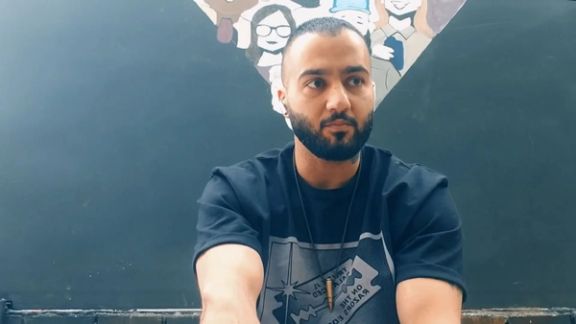
A group of high profile political prisoners in Iran have denounced the death sentence handed down to dissident rapper Toomaj Salehi, calling it a sign of Iran's "inhuman nature and deep corruption."
Earlier this week, an Iranian revolutionary court sentenced the outspoken artist to death for his songs supporting the nationwide protests of 2022, charges that his lawyer, Amir Raeisian, claims he had previously been acquitted of.
Among the 14 political prisoners who have voiced their concerns are Nobel laureate Narges Mohammadi, former MP and daughter to former president Faezeh Hashemi Rafsanjani, reformist politician Mostafa Tajzadeh, civil rights activist Golrokh Iraee, political activist Abdollah Momeni, and Islamic scholar Sedigheh Vasmaghi.
The group stated that the Iranian government "reacts with extreme cruelty even to protests made in the language of art." A 20-day appeal period is available to 33-year-old Salehi, dubbed "the world's bravest rapper" by Western media. According to his lawyer, he intends to appeal the decision.
The statement read, "The punishment for our silence today is the death sentence for all of us tomorrow; they will silence every voice. This absolute horror will end with the infinite power of people's resistance in these occupied streets."
Unions and artists in Iran have also raised their concerns and asked for Salehi's penalty to be reduced. Khashayar Sefidi, suspended from art school in Iran for participating in the 2022 nationwide protest, announced on Saturday that he had begun a hunger strike at Iran Music House in Tehran to protest Salehi's harsh punishment.
“I am worried for Tomaj's life. I am worried, and there is nothing I can do. I can only show my support with what I have: my body and my will. To oppose the injustice against Toomaj and others like him,” Sefidi wrote in an Instagram post on Saturday.
Fars Province Teachers Trade Union also released a statement on Friday, calling Salehi's sentence "unfair" as "the judiciary doesn't see embezzlers and thieves stealing the public funds, but they arrest artists.”
Dozens of celebrities from singers to actors have been arrested since 2022, many of whom have been banned from work, had bank accounts frozen and been given travel bans, in addition to heavy fines and even prison terms.
Asserting that "the path of legal criticism and activism" has been blocked in Iran, these trade union activists wrote: "The suppressed anger of the people may flare up in the near future, leading to more radical movements in society."
Additionally, the Khuzestan Province Teachers' Trade Union has condemned Toomaj Salehi's court as "unfounded".
Iranians in diaspora have organized rallies over the weekend across four continents, from Australia to Europe and North America to protest the death sentence.
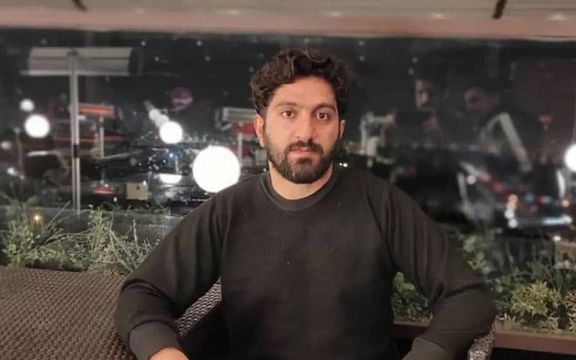
The families of two political prisoners in Iran are fighting to save them from looming execution amid Iran's killing spree which last year alone saw over 800 people hanged.
Reza Rasaei and Habib Deris are the latest to face imminent execution, a trend which has peaked since the 2022 uprising, sparked by the death in morality police custody of Mahsa Amini, detained for not wearing her hijab according to Iran's strict dress code.
Reza Rasaei was sentenced to death in 2022 amid the protests. He was accused of the murder of Nader Beirami, a senior intelligence officer of the IRGC, with his conviction being upheld by the Supreme Court in early December.
Amnesty International earlier voiced its concern, urging Iranian authorities to halt the execution, citing a lack of clear evidence and fair trial standards. “I urge you to immediately grant Reza Rasaei access to his family, independently chosen lawyer, and adequate medical care," read part of Amnesty's letter of appeal.
Simultaneously, reports have emerged about Habib Deris being moved to solitary confinement, often a sign of a looming execution. A source close to the family of Deris told HRANA, a news agency of human rights activists in Iran, "He was transferred to solitary confinement without any clear reason provided."
Deris is among six men sentenced to death by the Revolutionary Court in Ahvaz, accused of affiliation with the Harakat al-Nidal group and involvement in operations that resulted in the deaths of security personnel.
Also known as the Arab Struggle Movement for the Liberation of Ahwaz (ASMLA), the group is classified by Tehran as a ‘terrorist’ organization responsible for acts of terror including an attack on a military parade in Ahvaz on September 22, 2018, which killed 25 military and civilians.
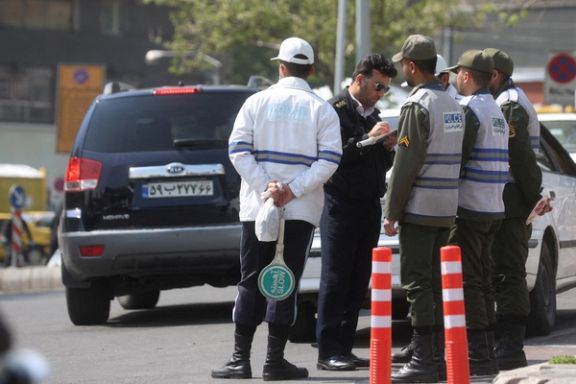
The recent hijab crackdown has exposed deep divisions among Iran’s ruling ultra-hardliners, and a potential campaign to position President Ebrahim Raisi as the successor to Supreme Leader Ali Khamenei upon his passing.
The crackdown began on April 13 with the return of the infamous morality patrols to the streets. The extensive violence including sexual harassment against women has since been widely criticized by some hardliners and the media in Iran, including those close to Speaker of the Parliament Mohammad-Bagher Ghalibaf, as well as some religious Iranians who are supportive of enforcement of hijab rules and Khamenei’s positions in general.
On April 19, a tweet from Mehdi Fazaeli, deputy chief of the office overseeing the publication of Khamenei’s speeches and writings, further escalated controversies surrounding hijab enforcement methods—not the hijab principle—signaled Khamenei’s potential displeasure with the excessive and harsh enforcement f hijab.
In his tweet, Fazaeli first quoted Khamenei’s April 2023 famous edict about hijab last year and added in a note that “certain officials have recently been admonished [by the Supreme Leader] for their out of the ordinary actions [in enforcement of hijab].”
Fazaeli came under an avalanche of attacks from the ultra-conservative Paydari Party members and their allies, in media and social media, notably the ultra-hardliner chief editor of Kayhan daily, Hossein Shariatmadari, who is an appointee of the Supreme Leader. They accused Fazaeli of lying and misrepresenting Khamenei’s position with his tweet, and even being an enemy “infiltrator” in his office.
The Paydari Party itself is positioned at the extreme end of the fundamentalist camp in the Islamic Republic and other ultra-hardliners often refer to them as “super-revolutionaries”.
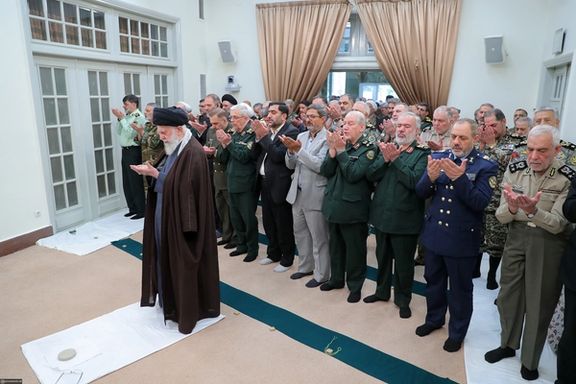
Interestingly, the Revolutionary Guard (IRGC) linked Javan newspaper rose to Fazeli’s defense in an editorial Monday and criticized Shariatmadari for fanning the flames of a perceived “dichotomy” between Khamenei and his office. The editorial suggested that the Supreme Leader’s own authority is being challenged with ulterior motives “not to be discussed now”.
The party has also found allies in what is being referred to in Iranian political circles as the Mashhad Circle, including President Raisi’s influential and notorious father-in-law, Ayatollah Ahmad Alamolhoda, who expresses views very similar to those of Paydari. Alamolhoda, the most prominent figure of the Mashhad Circle, represents Khamenei in Khorasan-e Razavi Province and is the custodian of the shrine of the eighth Shia imam, Imam Reza.
In very veiled terms, the critics of the Paydari and its associates have hinted that the apparent rebellion of the Paydari against Khamenei, or at least his son Masoud and his associates, may be a plot to place Raisi on the leadership throne when Khamenei dies.
“There is a lot of jostling going on behind the scenes and only muffled noises are heard outside these rooms. The Raisi circle have neutralized Speaker Mohammad-Bagher Ghalibaf and will eventually push aside the former nuclear negotiator Saeed Jalili and his circle too,” a political analyst who requested anonymity told Iran International.
The hijab crackdown is spearheaded by the far-right Paydari Party and its allies in the government of President Raisi including the Interior Minister Ahmad Vahidi, Police Chief Ahmadreza Radan, and Meysam Nili-Ahmadabadi, an advisor to the Minister of Islamic Guidance Mohammad-Mehdi Esmaili.
Nili-Ahmadabadi, a member of the Paydari Party and brother to Raisi’s son-in-law Meghdad, is a shadowy figure with much influence in many government and state bodies including the state broadcaster (IRIB) and the Supreme Council of the Cultural Revolution where he heads the Hijab and Chastity taskforce.
Nili-Ahmadabadi is also the managing director of Raja News, the unofficial mouthpiece of Paydari Party and the late Ayatollah Mesbah Yazdi’s followers. He has close ties to security forces and maddahs (religious eulogists) with far-right political leanings.
The “super revolutionaries” were not satisfied even when the X account of Khamenei’s official website, khamenei.ir, retweeted Fazaeli’s tweet to support him. The hardliners continued their criticism even though Khamenei’s social media accounts are overseen by his youngest son, the shadowy Masoud Khamenei. This can be interpreted as a challenge by some hardliners to Khamenei’s own son before an impending scramble for succession.
Fazaeli’s critics, including Shariatmadari, insist that they need to hear the criticism from the “Supreme Leader’s own lips”.
“We emulate Mr Khamenei, not Khamenei.ir,” a tweet in response to Fazaeli said, which is being widely quoted as evidence of defiance by ultra-hardliners and their refusal to acknowledge the authority of Khamenei.ir and its social media accounts.
The Paydari and their allies are also being referred to by other hardliners and conservatives on social media as Khavarij (Kharijites), the first sect of Islam who rebelled against Khamenei’s namesake, the fourth Caliph and the first of Shia Imams, Ali ibn Abi Talib.
“The Khavarij are sharpening their swords and smearing them with poison,” Ghorbanali Salavatian, a former IRGC commander, tweeted. This referred to Ali’s assassination with a poison-coated sword by a member of the sect in 661 AD.
In an editorial for the reformist Etemad newspaper on Monday, prominent commentator Abbas Abdi referred to the complicated ideological and political background of ultra-hardliner groups who he said have an apocalyptic ideology and a cult-like organization.
Abdi contended that the principal characteristic of the most radical group of ultra-hardliners is “power mongering” and that they have been ousting all other ultra-hardliners from centers of power.
Many are also pointing out the similarity of the behavior and stances of the Paydari circle with those of Mahmoud Ahmadinejad, who in 2011 scornfully quit work for eleven days when Khamenei reinstated an interior minister, Heydar Moslehi, who he had fired.
Henceforth Ahmadinejad and his supporters came to be referred to as the “deviant current” in the vernacular of Khamenei loyalists.
“The real question is whether IRGC’s top echelon would only watch the gladiators in the arena now and wait to step in when the day comes or take action,” Abdi added.

The United Nations High Commissioner for Human Rights has expressed serious concerns over the Iranian government's continued use of force and repression to enforce hijab laws.
Volker Türk said the move has led to widespread discrimination and violence against women and girls.
“We have received reports of widespread arrests and harassment of women and girls - many between the ages of 15 and 17.”
On April 21, the head of Tehran's Islamic Revolutionary Guard Corps (IRGC) announced the establishment of a new enforcement body trained to implement hijab laws "in a more serious manner" across public spaces.
The High Commissioner also highlighted concerns about the impending approval of a new hijab bill by the Guardian Council, tasked with reviewing parliament's legislation. An earlier version of this draft bill suggested penalties that could include up to 10 years in prison, flogging, and hefty fines for those who defy the dress code, measures which the UN official stressed are cruel and inhumane, and constitute a breach of international human rights standards.
The Commissioner also expressed concern over the recent sentencing to death of rapper Toomaj Salehi by the Isfahan Revolution Court. Salehi, known for his critical views expressed during the 2022 nationwide protests following the death of Mahsa Amini in police custody, was charged with "corruption on earth."
Amini's death had sparked widespread outrage over the enforcement of hijab laws, which subsequently led to her detention.
The High Commissioner has called for the immediate and unconditional release of Salehi and all individuals detained for exercising their freedoms of opinion and expression.
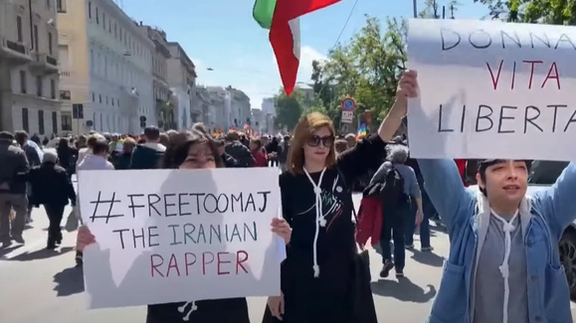
Iranian diaspora has taken to the streets since Wednesday to protest against the dissident rapper Toomaj Salehi's death sentence as calls for continuation of protests over the weekend are mounting.
Rallies are being held in several European, US, and Canadian cities, including London, Bonn, The Hague, Frankfurt, Berlin, Hamburg, Milan, Copenhagen, Montreal, and Washington, to urge their governments to halt the execution.
Protests are also planned for the weekend in Melbourne, Sydney, Vancouver, Vienna, Prague, and Port Douglas.
"We are here to get the international community to put pressure on Iran to stop Toomaj's execution," a protester in Berlin told Iran International on Friday.
A group of Iranians in Washington DC are staging a sit-down strike. "Within 24 hours of Toomaj's death sentence being announced, we started a strike in Washington, and many people joined us despite it being during work hours. We plan to continue protesting over the weekend," Siamak Aram, a protester and political analyst, told Iran International on Friday.
Toomaj Salehi's death sentence by the Revolutionary Court of Isfahan has been criticized widely domestically and internationally since his lawyer announced the verdict on Wednesday.
A 2021 single by Toomaj Salehi, Rat Hole, broke the underground Iranian rap scene. In the song, he attacked Iranians outside and inside Iran who chose to support the regime or did not use their platforms to enhance or relay the voices of struggling and dissenting Iranians.
He became a household name and a symbol of heroic resistance when he joined protesters in 2022 that erupted over the death of Mahsa Amini, fatally injured in police custody for wearing an "improper" hijab.
Toomaj Salehi was initially arrested in 2022, when the intelligence ministry in Isfahan province violently arrested him again for his artistic activities in support of the anti-government movement. He was tortured severely and forced to make televised "confessions" while in custody.
After avoiding a death sentence due to a Supreme Court ruling, he was sentenced to six years and three months in prison in July 2023.
Salehi's lawyer said that the Revolutionary Court of Isfahan later issued new charges in addition to those he had previously been cleared of.
The defense team for Toomaj Salehi has 20 days to file an appeal against the ruling - and they will, according to his lawyer, Amir Raesian.
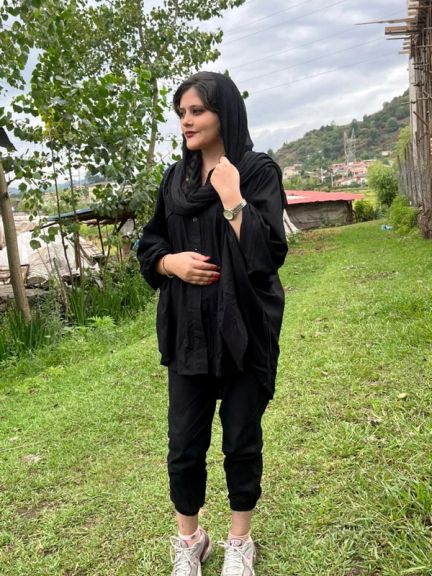
Mahsa Amini's mother, the icon of the nationwide protests during which more than 550 people were killed, also condemned the outspoken rapper’s harsh sentence on Thursday.
“Let Toomaj breathe so that his mother and the mothers of my land don't die,” she said.
On Thursday, Amnesty International also issued the following statement: “Iranian authorities must quash Toomaj Salehi’s conviction and death sentence and release him immediately.”
In videos circulating on the Internet, posters of him are seen on the walls and highways of Iran. There were also reports from Tehran of night-time chants against the regime, as well as youngsters writing slogans on city walls in support of the increasingly popular artist.